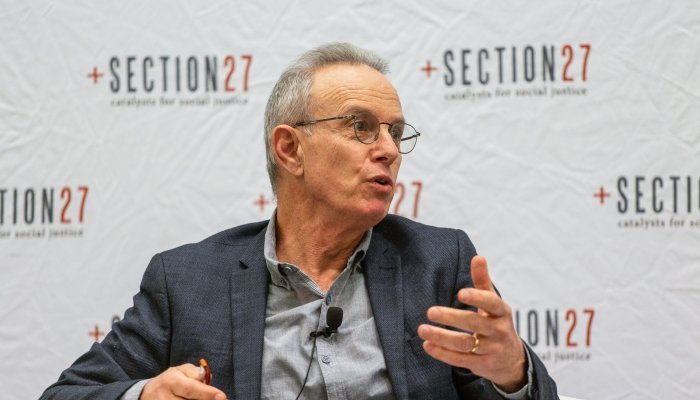A GIBS Forum, titled ‘The Future of Healthcare in South Africa: Analysing the NHI and HMI’, was held in October last year and featured four leading experts in the field to dissect the Health Market Inquiry report and bring it to the consumer’s level.
The HMI report at a glance
The Health Market Inquiry (HMI) – chaired by retired Chief Justice, Sandile Ngcobo – was established by the Competition Commission in 2014 to investigate South Africa’s private healthcare market that caters to about 17% of the population covered by medical schemes and accounts for close to 52% of the country’s health expenditure.
The report is a culmination of five years of consultations and engagements with various stakeholders in private and public healthcare and is viewed as a transformative report that will, if implemented, lead to health system reforms that could assist the country as it moves towards achieving universal health coverage. The HMI report was handed to the Competition Commission and the Minister of Trade and Industry to table in parliament for regulators to pour over it.
Umunyana Rugege, executive director of civil society group SECTION27 which focuses on access to healthcare services, said her organisation had been involved in the HMI from 2014 with a focus on the right of access to healthcare services as stipulated in the Constitution. The organisation attended public enquiries and brought their patients to tell their stories of struggle to gain healthcare services through the private sector.
“One of the key things we understood from the very beginning was that there was incomplete and inadequate regulation within the sector. Whilst it was never our call to regulate the sector, the call was to ensure that even in the private sector the state has an obligation in terms of Section 27 of the Constitution to enable the advancement of the right to access to healthcare services,” explained Rugege.
...we wanted to tell the story of what it means when we have a failing system...
“Even though the actual analysis would be done by technical people – actuaries, accountants and economists – we wanted to tell the story of what it means when we have a failing system,” she said.
Key recommendations
Dr. Ntuthuko Bengu, HMI panellist and health sector specialist, emphasised the symbiotic relationship between South Africa’s private and public health sectors and said these two could not be divorced from each other. He further explained that while the public health sector had been put under scrutiny over the years there hadn’t been an in-depth look at the private health sector before the HMI.
“When we started, a lot of industry stakeholders said to leave competition out of healthcare – it is not relevant. You can’t talk access if the issue of pricing of services is out of reach for most South Africans and you cannot talk about it being in line with the Constitution if the access is there but only in nominal terms,” said Bengu.
...the government would have no hope in hell of getting quality service or good pricing...
“If the NHI were to come into an environment where the hospitals are as they are right now, it would not work. Life owns the Eastern Cape, Mediclinic owns Limpopo, Western Cape and Northern Cape, while Netcare is strong in KwaZulu-Natal and Gauteng, and the government would have no hope in hell of getting quality service or good pricing if it walked into the situation as it is now. This is why we have defended the question of whether we need another health regulator, because even mature NHI systems like the UK have a supply-side regular because they understand that. We have gone into great lengths to defend it because we must deal with the pricing and licensing issue,” explained Bengu, adding that the healthcare systems cannot continue to have large private hospital groups getting all the licenses while undercutting smaller service providers,” added Bengu.
Dr. Eric Buch, Professor of Health Policy and Management and former Dean of the Faculty of Health Sciences at the University of Pretoria, said both the private and public health sectors have structural problems that need fixing and urged stakeholders to implement the HMI recommendations.
“The reality of SA is that we carry a heavy burden of disease. Our health system is appalling. What we know at the moment is that we don’t get value for the money we invest in the public health sector, and we have problems of quality and corruption. At the moment there has long been lack of faith and trust in the private sector in terms of offering good value for money and being a reliable partner in the goals of offering healthcare,” said Buch.
“I would argue that it is in the self-interest of the private sector to move as rapidly as possible to implement the HMI recommendations, even though a lot of people are saying ‘hang on, this is going to do all kinds of negative things to the bottom line’,” he explained.
Regulated competition and pricing
The issue of regulated competition and pricing – or lack thereof – in private healthcare came out strongly in the HMI recommendations and the forum’s panel agreed on its importance when charting a way forward.
Dr. Jane Goudge, Professor and director of the Centre for Health Policy at the University of the Witwatersrand, strongly argued for regulated competition.
“Regulated competition means that purchase schemes should compete for the business of members based on the price they charge on a monthly basis and the quality of healthcare they buy on our behalf,” she said, explaining that there are three key elements to it. One being a single package, meaning medical schemes need to look vaguely alike. Two being the Risk Adjustment Mechanism, which prescribes that the schemes should operate on a level playing field. The third element, explained Goudge, is the Price Negotiating Forum.
“The enquiry has documented that there is lots of concentration in the industry and potentially lots of collusion. We need those to be negotiated in a way that benefits the client and neither will happen without the effective participation of government. That requires active government to make that happen,” she said.
Where to from here?
One of the conclusions of the HMI is that the private health market is characterised by high and rising costs of healthcare and medical scheme cover, disempowered and uninformed consumers, and ineffective regulation and failures of accountability at many levels.
In addressing these issues, the forum’s panellists called on the government to play a more active role in transforming both the public and private health sectors if the NHI is to succeed.
“The role of government is to create a governance framework but also to steward the health sector. The bottom line is that we are not creating a pipeline to expand the health system in line with the vision of NHI. You take a poorer country like Ethiopia and look at where they were and what they developed, how they opened up a number of medical schools and nursing colleges – there was a real determination and drive and I don’t think we’ve seen that. Going forward, I think the government has to move decisively to play its governance role in the health sector,” said Buch.













